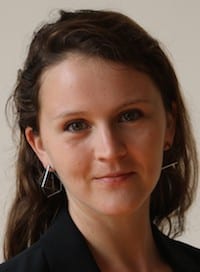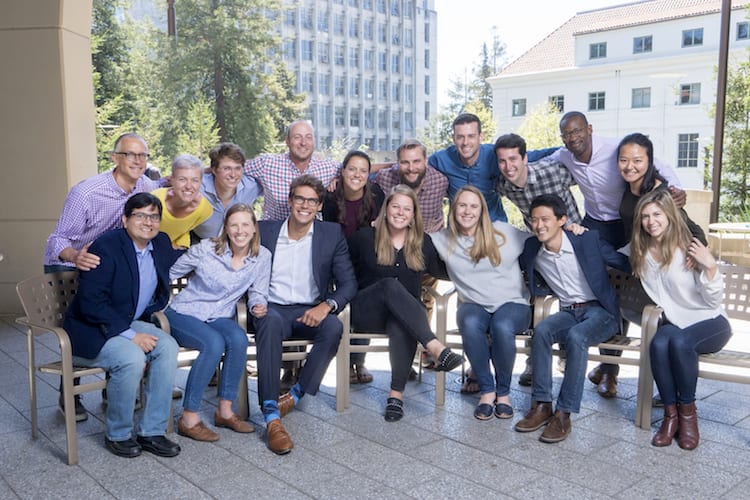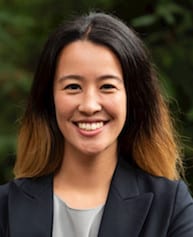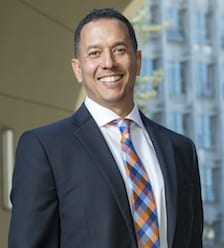Katharine Hawthorne, MBA 20, came to Haas to build a career in impact investing.

She’s found plenty to dive into so far—as co-president of the Haas Private Equity Club, a principal of the school’s student-run social impact fund, and a summer intern at Patamar Capital in Jakarta, helping to make investment decisions in high-growth companies in South and Southeast Asia.
Now in her second year at Haas, she’ll be able to go even deeper, in a newly expanded sustainable and impact investing program that Berkeley Haas rolled out last week. The program, called Sustainable and Impact Finance, or SAIF, is focused on three sectors: sustainable investment, impact investment, and impact entrepreneurship.
Moving to the next level
By creating the new pathways, the program will better position students who aim to work in sustainable and impact finance as public fund managers or private equity investors, or in the startup world.
Assoc. Prof. Adair Morse spent the past year developing the new program with Prof. Laura Tyson, faculty director for the Institute for Business and Social Impact (IBSI).
SAIF includes new courses, expanded activities, research projects, internships, and student investment fund management opportunities in impact finance, which differs from traditional investment finance because investors aim for both positive financial return and a positive impact on environmental, social, and governance (ESG) outcomes, as well as social justice. In class, students learn how to evaluate a company based on its ESG performance.

“With SAIF, we’re continuing the Berkeley Haas tradition of thought leadership in sustainability and impact in finance and entrepreneurship,” Tyson said. “There’s deep interest in sustainable and impact investing careers at Haas, and our existing courses and activities, including the student-run Haas Socially Responsible Investment Fund, have been enormously successful. SAIF will build on this strong foundation, enabling us to move to the next level in an organized, targeted, and meaningful way that keeps pace with rapid changes in sustainable and impact investing and impact entrepreneurship.”
“Haas needs to continue to lead the way in these areas,” said Morse, faculty director for SAIF. “The world is changing and we have issues of climate change, supply chain transparency, gender diversity, and social justice to take care of and this should be fully integrated into the business curriculum.”
A pioneer in corporate social responsibility

In a recent Wall Street Journal article, Haas was ranked the top graduate business school in sustainable finance and investing, according to data from the QS World University Rankings. The school is a pioneer in social impact investing, with efforts beginning during the late 1950s when late Dean Budd Cheit launched the first courses on corporate social responsibility. Haas now offers a total of nine courses devoted to the topic, more than any other school, as well as several others that cover related topics such as social impact metrics and impact ventures.
SAIF’s three tracks are designed to emphasize different aspects of impact investing. The course pathways are:
- Sustainable investment: This track trains students to be managers of and investors in sustainable/responsible/ESG investment portfolios, primarily in publicly traded stocks and bonds. First-year courses include “Financial Information Analysis” and “Sustainable Portfolio Construction,” followed by a full year of investment work with the $3 million Sustainable Investment Fund. The fund, formerly called the Haas Socially Responsible Investment Fund, was founded in 2007 and has graduated over 90 students. Enrolled students become fund managers, analyzing investments and constructing and managing a portfolio.

MBA students who have managed the Sustainable Investment Fund at Haas, formerly called the Haas Socially Responsible Investment Fund. Photo: Jim Block - Impact investment: Impact investing, a term coined by the Rockefeller Foundation in 2007, includes investments that generate financial returns and create a positive impact. This track prepares students for investment careers in private equity, venture capital, and real assets. Courses include “Impact Finance & Entrepreneurship” and “Impact Venture Partners: Portfolio.” Another course, “Impact Investing Practicum,” places student teams with impact investors to complete pre-vetted projects. Haas has placed seven teams, a total of 20 students, over the past several years in projects for clients including Omidyar, Salesforce, Patagonia, Cambridge Associates, and Gratitude Railroad.

Jessie Tang, MBA 20, worked on an impact investing project for Gratitude Railroad. - Impact entrepreneurship: This track helps students understand social impact financing from both a fund perspective and a startup perspective. Courses include “Impact Startup Launchpad” (previously Social Lean Launchpad), and “New Venture Finance.” Haas entrepreneurship lecturer Jorge Calderon leads the pathway, which includes management of a new fund called Berkeley Impact Venture Partners. The fund has a dual strategy: The “catalyst fund” provides startup teams at the pre-seed stage with $5,000 grants, while the “scale fund” helps startup teams, on or off campus, that are further along in their development with larger market rate equity investments. Electives for students in this track include “Food Innovation Studio,” “Impact Disco,” and “Social Impact Metrics.”

Jessie Tang, MBA 20, said the pathways are a great way to formalize all of the program’s offerings. “I like that they’re trying to put more of a framework around this,” said Tang, who was on a team assigned last spring to an Impact Investing Practicum project with Gratitude Railroad, an alternative investment platform committed to solving environmental and social problems. “They’re working out ways to help the students navigate the course offerings in a better way.”
Growing interest in impact investing careers
Additional members of the SAIF team, who helped develop parts of the program and will also teach courses, include William Rindfuss, executive director of strategic programs, Julia Sze, a lecturer in social leadership, Ben Mangan, executive director for the Center for Social Sector Leadership, Nora Silver, founder and faculty director with the Center for Social Sector Leadership, and Assoc. Prof. Panos Patatoukas, who is launching new research on impact finance.
Tang, who will be the Graduate School Instructor (GSI) for the Impact Finance & Entrepreneurship class Morse is teaching this fall, is among a growing group of Haas students and alumni working in social and impact investing, including Patrick Hamm, MBA 20, who was a research analyst intern at Parnassus Investments, a pioneer in socially responsible investments, in San Francisco last summer; Adrian Rodrigues, MBA 18, who is co-founder and managing partner of Hyphae Partners, which works with businesses to develop and finance regenerative business models; Zeina Fayyaz Kim, MBA 16, an associate partner at NewSchools Venture Fund in Oakland, a national nonprofit venture philanthropy fund focused on public education; and Zach Knight, MBA 15, who is a co-founder and partner of Blue Forest Conservation, which works to protect forest health through a forest resilience bond.